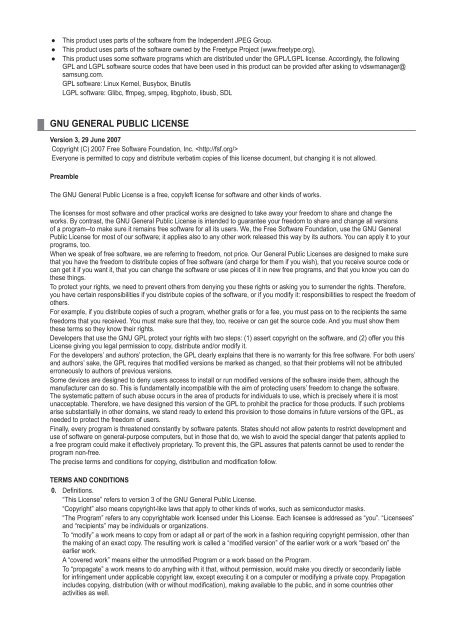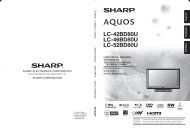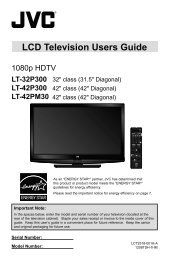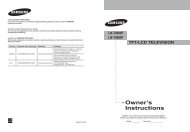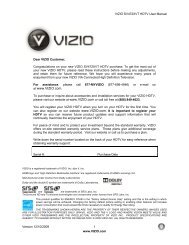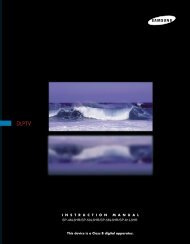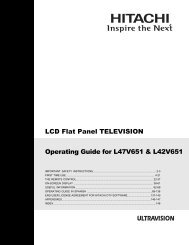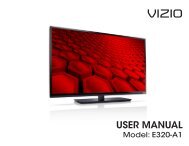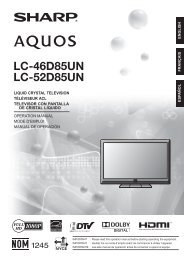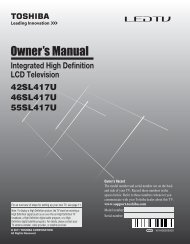LCD TV - Specs and reviews at HDTV Review
LCD TV - Specs and reviews at HDTV Review
LCD TV - Specs and reviews at HDTV Review
You also want an ePaper? Increase the reach of your titles
YUMPU automatically turns print PDFs into web optimized ePapers that Google loves.
●<br />
●<br />
●<br />
This product uses parts of the software from the Independent JPEG Group.<br />
This product uses parts of the software owned by the Freetype Project (www.freetype.org).<br />
This product uses some software programs which are distributed under the GPL/LGPL license. Accordingly, the following<br />
GPL <strong>and</strong> LGPL software source codes th<strong>at</strong> have been used in this product can be provided after asking to vdswmanager@<br />
samsung.com.<br />
GPL software: Linux Kernel, Busybox, Binutils<br />
LGPL software: Glibc, ffmpeg, smpeg, libgphoto, libusb, SDL<br />
¦ GNU GENERAL PUBLIC LICENSE<br />
Version 3, 29 June 2007<br />
Copyright (C) 2007 Free Software Found<strong>at</strong>ion, Inc. <br />
Everyone is permitted to copy <strong>and</strong> distribute verb<strong>at</strong>im copies of this license document, but changing it is not allowed.<br />
Preamble<br />
The GNU General Public License is a free, copyleft license for software <strong>and</strong> other kinds of works.<br />
The licenses for most software <strong>and</strong> other practical works are designed to take away your freedom to share <strong>and</strong> change the<br />
works. By contrast, the GNU General Public License is intended to guarantee your freedom to share <strong>and</strong> change all versions<br />
of a program--to make sure it remains free software for all its users. We, the Free Software Found<strong>at</strong>ion, use the GNU General<br />
Public License for most of our software; it applies also to any other work released this way by its authors. You can apply it to your<br />
programs, too.<br />
When we speak of free software, we are referring to freedom, not price. Our General Public Licenses are designed to make sure<br />
th<strong>at</strong> you have the freedom to distribute copies of free software (<strong>and</strong> charge for them if you wish), th<strong>at</strong> you receive source code or<br />
can get it if you want it, th<strong>at</strong> you can change the software or use pieces of it in new free programs, <strong>and</strong> th<strong>at</strong> you know you can do<br />
these things.<br />
To protect your rights, we need to prevent others from denying you these rights or asking you to surrender the rights. Therefore,<br />
you have certain responsibilities if you distribute copies of the software, or if you modify it: responsibilities to respect the freedom of<br />
others.<br />
For example, if you distribute copies of such a program, whether gr<strong>at</strong>is or for a fee, you must pass on to the recipients the same<br />
freedoms th<strong>at</strong> you received. You must make sure th<strong>at</strong> they, too, receive or can get the source code. And you must show them<br />
these terms so they know their rights.<br />
Developers th<strong>at</strong> use the GNU GPL protect your rights with two steps: (1) assert copyright on the software, <strong>and</strong> (2) offer you this<br />
License giving you legal permission to copy, distribute <strong>and</strong>/or modify it.<br />
For the developers’ <strong>and</strong> authors’ protection, the GPL clearly explains th<strong>at</strong> there is no warranty for this free software. For both users’<br />
<strong>and</strong> authors’ sake, the GPL requires th<strong>at</strong> modified versions be marked as changed, so th<strong>at</strong> their problems will not be <strong>at</strong>tributed<br />
erroneously to authors of previous versions.<br />
Some devices are designed to deny users access to install or run modified versions of the software inside them, although the<br />
manufacturer can do so. This is fundamentally incomp<strong>at</strong>ible with the aim of protecting users’ freedom to change the software.<br />
The system<strong>at</strong>ic p<strong>at</strong>tern of such abuse occurs in the area of products for individuals to use, which is precisely where it is most<br />
unacceptable. Therefore, we have designed this version of the GPL to prohibit the practice for those products. If such problems<br />
arise substantially in other domains, we st<strong>and</strong> ready to extend this provision to those domains in future versions of the GPL, as<br />
needed to protect the freedom of users.<br />
Finally, every program is thre<strong>at</strong>ened constantly by software p<strong>at</strong>ents. St<strong>at</strong>es should not allow p<strong>at</strong>ents to restrict development <strong>and</strong><br />
use of software on general-purpose computers, but in those th<strong>at</strong> do, we wish to avoid the special danger th<strong>at</strong> p<strong>at</strong>ents applied to<br />
a free program could make it effectively proprietary. To prevent this, the GPL assures th<strong>at</strong> p<strong>at</strong>ents cannot be used to render the<br />
program non-free.<br />
The precise terms <strong>and</strong> conditions for copying, distribution <strong>and</strong> modific<strong>at</strong>ion follow.<br />
TERMS AND CONDITIONS<br />
0. Definitions.<br />
“This License” refers to version 3 of the GNU General Public License.<br />
“Copyright” also means copyright-like laws th<strong>at</strong> apply to other kinds of works, such as semiconductor masks.<br />
“The Program” refers to any copyrightable work licensed under this License. Each licensee is addressed as “you”. “Licensees”<br />
<strong>and</strong> “recipients” may be individuals or organiz<strong>at</strong>ions.<br />
To “modify” a work means to copy from or adapt all or part of the work in a fashion requiring copyright permission, other than<br />
the making of an exact copy. The resulting work is called a “modified version” of the earlier work or a work “based on” the<br />
earlier work.<br />
A “covered work” means either the unmodified Program or a work based on the Program.<br />
To “propag<strong>at</strong>e” a work means to do anything with it th<strong>at</strong>, without permission, would make you directly or secondarily liable<br />
for infringement under applicable copyright law, except executing it on a computer or modifying a priv<strong>at</strong>e copy. Propag<strong>at</strong>ion<br />
includes copying, distribution (with or without modific<strong>at</strong>ion), making available to the public, <strong>and</strong> in some countries other<br />
activities as well.


